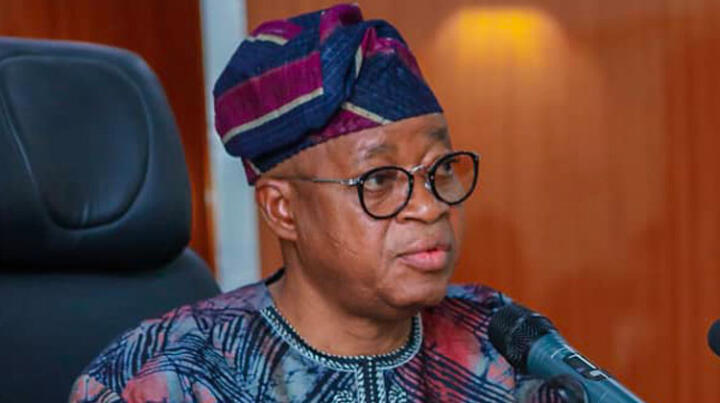Minister of Marine and Blue Economy, Adegboyega Oyetola, has reaffirmed that the Nigerian government is actively developing the marine and blue economy sector to become the country’s main source of income, surpassing crude oil in the near future. Speaking during a visit to the Institute of Maritime Studies at the University of Lagos, Oyetola emphasized that Nigeria possesses vast ocean and marine resources that remain largely untapped. He said the government’s strategic objective is to maximize these resources through investments in infrastructure, manpower training, and international collaboration.
Oyetola, accompanied by the Secretary-General of the International Maritime Organization (IMO), Arsenio Domínguez, highlighted that the blue economy offers Nigeria an opportunity to diversify revenue and create sustainable jobs, especially for young people. He urged youths to take advantage of the enormous potential in sectors such as shipping, logistics, fisheries, marine engineering, research, and offshore energy, noting that the success of the blue economy depends largely on the active participation of a skilled and innovative workforce.

The Minister explained that the Federal Government’s blueprint for the blue economy is anchored on sustainability, inclusivity, and innovation, stressing that training and capacity-building are central to achieving the ministry’s long-term objectives. He praised the collaboration between the University of Lagos and the Nigerian Maritime Administration and Safety Agency (NIMASA) in developing maritime education and research, noting that such partnerships are vital to strengthening the country’s maritime capabilities.
Oyetola also referenced the recently approved National Policy on Marine and Blue Economy, which he described as a major step toward unlocking Nigeria’s maritime potential. However, he warned that turning policy into tangible results would require increased financing, effective collaboration, and private sector participation. The government, he said, cannot singlehandedly fund the modernization of ports, expansion of fishery operations, or construction of climate-resilient coastal infrastructure.
He called for innovative financing mechanisms and robust partnerships between the government, local investors, and international stakeholders. According to him, progress already recorded in maritime surveillance, port rehabilitation, and fish harbour development demonstrates that real change is achievable with adequate funding and political will.
The Minister revealed that his ministry aims to generate about ₦2 trillion annually from the marine and blue economy by 2027. This, he said, will be achieved through the automation of revenue collection, curbing financial leakages, and creating new investment streams across shipping, marine logistics, aquaculture, and renewable energy. He emphasized that the ministry is prioritizing transparency and efficiency to boost investors’ confidence in the sector.
Oyetola expressed optimism that the fishing industry, if properly harnessed, could rival or even surpass oil in terms of profitability. He noted that fisheries and aquaculture alone could significantly contribute to food security, employment, and export earnings for the country. However, he acknowledged existing challenges such as high operating costs, limited access to foreign exchange, infrastructural deficits, and regulatory constraints, which the ministry is working to address through reforms and stakeholder engagement.
He also reiterated Nigeria’s ambition to reclaim a seat on the International Maritime Organization (IMO) Council, saying that greater participation in global maritime governance will strengthen the country’s voice and visibility in international trade. This ambition, he said, aligns with Nigeria’s broader strategy to expand its maritime influence, enhance port competitiveness, and promote responsible ocean resource management.
Oyetola admitted that the sector still faces hurdles, including underfunding, marine pollution, piracy, and the effects of climate change. Nonetheless, he maintained that with consistent policy implementation, stronger public-private partnerships, and transparent governance, Nigeria can transform these challenges into opportunities for sustainable growth.
In conclusion, the minister underscored that the blue economy represents the future of Nigeria’s prosperity. With deliberate planning, strategic investments, and effective coordination, he said, the marine and blue economy can evolve into the nation’s primary revenue driver, creating millions of jobs, fostering innovation, and ensuring long-term economic stability beyond oil dependence.
Support InfoStride News' Credible Journalism: Only credible journalism can guarantee a fair, accountable and transparent society, including democracy and government. It involves a lot of efforts and money. We need your support. Click here to Donate
